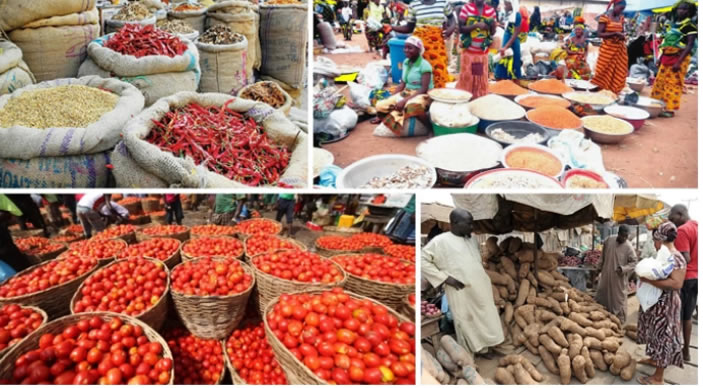The price of essential commodities, which comprise various Foodstuffs, continues to crash following the LEADERSHIP report in Damaturu, the Yobe State Capital.
On Saturday and Sunday, the sustainability of the price of Foodstuffs dropped as consumers began to respite across the state due to the reduction of the cost of Foodstuffs, which includes rice, Maize, Mile and beans.
Speaking to one of the marker leaders, Muhammed Buba, at the grains market in Damaturu, they said the price of Foodstuffs drastically dropped was beneficial to both consumers and traders.
He said, ” As I am speaking to you now, the prices of most food items have indeed dropped, and we are so grateful for that; we know many people are suffering due to the high rural and urban living costs.
According to him, food items such as maise, localised ice, beans, and millet have a marked drop in their consumption during Ramadan.
He said that we want to thank the state governor and traditional rules for their efforts to warn traders not to increase the price of Foodstuffs during and after Ramadan.
We are now happy that there is a light continuous drop in the price of rice and maise, by at least 40 per cent. This is a significant achievement we witnessed so far. I cannot tell you the reason for the drop in food prices, but one good indicator is that the federal government imports food from outside the country.
Another Foodstuffs trader, Baba Gana, at the Damaturu primary market, alluded to the recent drop in the price of food items, which he attributed to the harvest season of some produce.
” I want to inform you that the price of Foodstuffs items like beans, sugar, and rice is dropping gradually, as we have observed this few days before the commencement of Ramadan; we are happy with the recent drop in the items, and we want it to continue dropping to be less price,” he said.
“As of December last year, we sold a bag of local rice between 80,000, but now the same bag goes for 65,000. This is a very good thing. We want everybody to afford to buy it at a lower price, not only rice but all food items across the country.
He added, ” Beans for now have been dropping since the beginning of Ramadan; we had beans at the highest price, but now the same quality sells for 75,000.
Alhaji Bukar Musa, a resident of Damaturu, said we could not tell you the reasons for the drop in the price of these food items, but we are happy they are dropping at fewer people will buy want ever they want to buy at a lower cost.
He appealed to the Yobe state governor, Hon Mai Mala Buni, to set up a committee to monitor the Foodstfoodstuffse state’s price control for the people’s interest.
He also commented the state governor for his efforts to distribute palliative during this holy month of Ramadan to the less privileged across the state, saying
A civil service of the Ministry of Commerce and Industry called on the state to address the high Cost of Bread, Pure water and grout, which was affecting people’s lives in the state.
Also, another Businessman from the Potiskum local government area of Yobe state, Mallam Idi Mai Kaya, said Foodstuffs have drastically dropped in some of the major regional markets in the state
This led to a significant drop in the price of grains like Sorghum, beans, and Maize in addition to massive imports of the commodities; the recent massive imports of some of the agricultural produce also contributed to the drop in price.
He said the price of maise is now 40k instead of 80k; the Millet is 80k but now 47k. The price has dropped by 40% at most of our grain markets.
He said the prices of grains have dropped; groundnut, yam, palm and vegetable oil, and Irish potatoes remain slightly high in many markets visited by our correspondents.
In another development, Some fruit sellers who spoke with LEADERSHIP in Damaturu, the state Capital, have decried continuous low sales of their wares.
LEADERSHIP gathered that many traders struggle to sell their goods due to residents’ high cost of living and reduced purchasing power.
Mustapha Umar, a fruit seller at Gujba Road in Damaturu, said his sales had dropped significantly despite the expectations of higher demand during Ramadan.
“During fasting, people usually buy a lot of fruits like oranges, watermelons, dates, water Milo, and Banana, but this Ramadan period.
“Customers are complaining that they do not have enough money, and many now buy in smaller quantities than they used to,” he said.
However, Mustapha attributed the low sales to the rising cost of transportation and inflation, which had pushed up the prices of the items.
“Before, I used to sell not less than two full baskets of oranges in a day, but now, it takes me almost two days to finish one basket”, said Mustapha.
Moreover, the dates that are a must-have for fasting are not selling as they should. People want to enjoy but don’t have money to buy what they want.
“I pray the sales pick up as the fasting progresses because I borrowed some money just to stock up my shop for the season,” she said.
Another fruit seller said he was experiencing low sales and had lost part of his capital. People are suffering and don’t have money to buy fruit.
He said, “We are pleading with the government to help stabilise food prices, reduce the cost of production and increase the purchasing power of the Naira in the country,” he said.
He also urged relevant authorities to intervene in controlling the high cost of food items, especially by addressing transportation costs and market levies.





